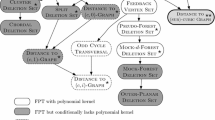Abstract
We describe an algorithm for the Feedback Vertex Set problem on undirected graphs, parameterized by the size k of the feedback vertex set, that runs in time O(ckn3) where c = 10.567 and n is the number of vertices in the graph. The best previous algorithms were based on the method of bounded search trees, branching on short cycles. The best previous running time of an FPT algorithm for this problem, due to Raman, Saurabh and Subramanian, has a parameter function of the form 2O(k log k /log log k). Whether an exponentially linear in k FPT algorithm for this problem is possible has been previously noted as a significant challenge. Our algorithm is based on the new FPT technique of iterative compression. Our result holds for a more general form of the problem, where a subset of the vertices may be marked as forbidden to belong to the feedback set. We also establish "exponential optimality" for our algorithm by proving that no FPT algorithm with a parameter function of the form O(2o(k)) is possible, unless there is an unlikely collapse of parameterized complexity classes, namely FPT = M[1].
Similar content being viewed by others
Author information
Authors and Affiliations
Corresponding authors
Rights and permissions
About this article
Cite this article
Dehne, F., Fellows, M., Langston, M. et al. An O(2O(k)n3) FPT Algorithm for the Undirected Feedback Vertex Set Problem. Theory Comput Syst 41, 479–492 (2007). https://doi.org/10.1007/s00224-007-1345-z
Issue Date:
DOI: https://doi.org/10.1007/s00224-007-1345-z




